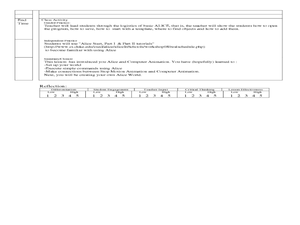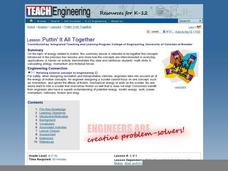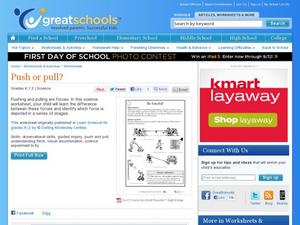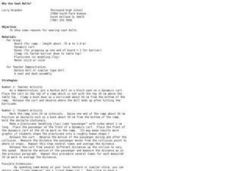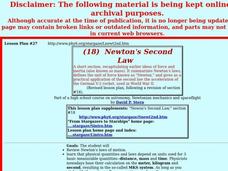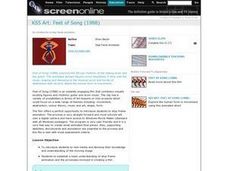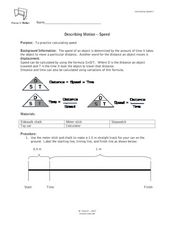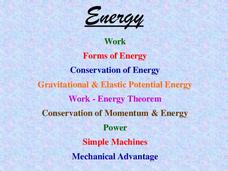Curated OER
Using A Video Camera In the Physics Classroom
Students use video cameras as a way to analyze and understand motion. In this motion lesson students complete an activity that helps them better understand motion and calculate time.
Curated OER
Still Movement
Students explore constant motion. Using photography equipment and a dark room, students develop photographs that depict motion. Students demonstrate the proper use of photograph equipment.
Curated OER
I'm Inclined to See
Pupils examine motion of a sphere on an inclined plane. In this inclined plane lesson students complete an activity to discover basic relationships.
Curated OER
Newton's Third Law
Students use inquiry and observation to explore Newton's third law of motion: for every action there is a reaction. In this physics lesson, students rotate through six stations set up with materials and picture directions illustrating an...
Curated OER
Animation: ALICE Software
Learners familiarize themselves with the ALICE software program. In this computer animation lesson, students are guided through a tutorial on how to use the ALICE software for animation.
Curated OER
How to Speed Up a Slow Grandfather- The Pendulum
Students explore the concept of periodic motion in relation to its function in a Grandfather type clock. In this periodic motion lesson, students use problem-solving skills and understanding of periodic motion to participate in a group...
Curated OER
Slinky Lab- Simulating the Motion of Earthquake Waves
Sixth graders simulate primary and secondary waves. In this earthquakes waves lesson, 6th graders experiment using a slinky to gain understanding of how waves are created during an earthquake. Students record observations in drawings....
Curated OER
Rectilinear Motion
Twelfth graders rewrite word problems using algebraic expressions. In this calculus lesson, 12th graders calculate the velocity, time and acceleration while analyzing real life scenarios. They solve problems related to when the...
Curated OER
How Do Things Move?
In this motion learning exercise, students will use a word bank to fill in the definition of Newton's three laws of motion. Then students will complete 4 short answer questions giving examples of Newton's three laws of motion.
Curated OER
Following Directions
Kindergartners learn about the ways force can stop and reverse motion. Several illustrations of children help them determine if the motion is causing an item to change direction. Next, they conduct an experiment to see if a water balloon...
Curated OER
Angular Momentum (Automaticity)
Second graders experience practicing with a wide variety of vocabulary terms that relate to the Vista/Module "Angular Momentum:" momentum, inertia, force; motion, direction, centripetal force; angular momentum, gyroscope, resist. They...
Curated OER
Puttin' It All Together
Students explain the concepts of kinetic and potential energy and how it can change forms. For this energy, motion, and frictional forces lesson students participate in a hands on activity that includes calculating energy.
Curated OER
Boating Safety and Water Sports - Lesson 3 - First Aid
What are the basic first aid supplies that should be on a boat? What should be done when someone stops breathing and/or their heart stops beating? Lesson three is only one of twenty-two lessons on boat safety. This lesson is about first...
Curated OER
Be forceful!
Didn't some scientist develop rules about force and motion? Youngsters can experience physical science as they determine which picture shows the force of pushing or pulling. Tip: Ask learners if they can think of any unseen forces that...
Curated OER
Don’t Sit Under the Apple Tree…You Might Become Famous
Students explore Newton's laws using CEENBoTs. In this physics lesson, students collect data and create tables and graphs. They calculate speed, acceleration and forces using mathematical formulas.
Curated OER
Why Use Seat Belts?
Students explore reasons why using a seat belt is a safe choice while riding in a car. In this physics/safety lesson, students set up and observe a doll with and without a seat belt moving down a ramp in a dynamics cart. Collision...
Curated OER
Newton's Second Law
Students examine how physical quantities and laws depend distance, mass and time. They examine the MKS system; meter, kilogram and second, for doing calculations.
Curated OER
The Inertial Balance
Students weigh objects using a triple beam balance. In this mass instructional activity, students use an inertial balance made with a metal rod to measure and graph vibrations of varying numbers of pennies in a bucket. References and...
Curated OER
Ramps 1: Let It Roll!
Students explore and measure the rate of spherical objects rolling down a ramp. They discuss why different ramps work better than others, and practice procedures for testing designs and recording results.
Curated OER
Feet of Song
Students establish a basic definition of stop frame animation and the processes involved in creating a film. Through guided practice and film reviews, they create their own stop motion animation in response to a film they have seen.
Curated OER
Hearts in Motion
Young scholars participate in cardiovascular activities. In this physical education lesson, students are divided into groups and brainstorm activities to get their heart rate up. Young scholars demonstrate the activity for classmates.
Curated OER
Describing Motion-Speed
Pupils study speed and learn how to calculate it. In this investigative lesson students participate in an activity that shows them how to calculate speed then they fill out a worksheet.
Urbana School District
Energy, Work, Simple Machines
The tension of the 236 strings in a grand piano exert a combined force of 20 tons on the cast iron frame. The presentation includes topics such as work, forms of energy, conservation of energy, gravitational and elastic potential energy,...
Curated OER
I'm Inclined to See; Physics, Math, Science, Experiments, Graphs
Young scholars discover the motion of a sphere on an inclined plane and discover basic relationships involving distance, time, speed(velocity), and acceleration.




